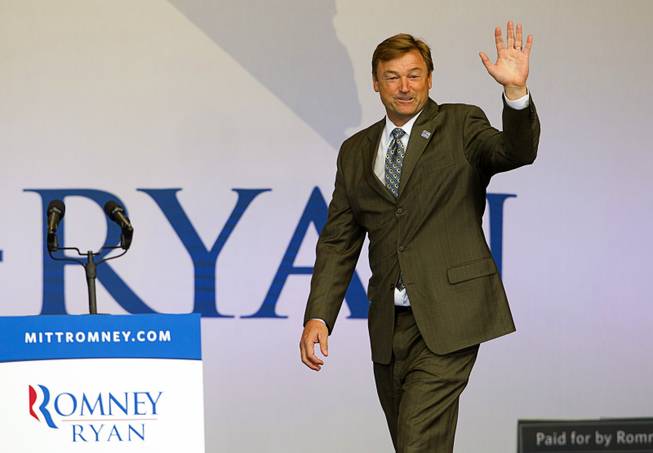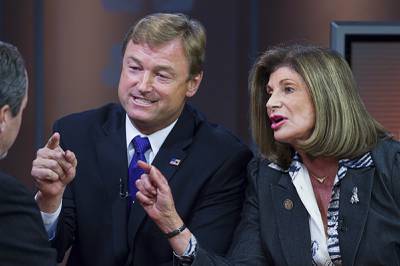
Sen. Dean Heller (R-NV) arrives for a Romney-Ryan campaign rally at the Henderson Pavilion Tuesday, Oct. 23, 2012.
Thursday, March 28, 2013 | 2 a.m.
Sun coverage
Two years ago, Sen. Dean Heller voted twice for Paul Ryan’s budget. This month, however, he declared it “not serious” and said he’s “absolutely open to revenue.”
Five months ago, the Nevada Republican held a key campaign rally at a Las Vegas gun shop to bolster his Second Amendment chops. Now he’s leaning toward support for universal background checks despite objections from the National Rifle Association.
And for years as a Northern Nevada congressman, he flatly rejected anything more than a meager guest worker program for some undocumented workers, voting against the Dream Act. At last month’s State of the Union, when President Barack Obama declared to broad applause that “now is the time” for comprehensive immigration reform, Heller leaned over to Rep. Steven Horsford, a Democrat from Las Vegas, to crow, “Looks like we got consensus on that one.”
Consensus has not been a word used often by or about Heller in Washington. But that was before he became the lone Republican senator elected in a state Obama won last year. That was also before, upon his appointment in 2011 to complete disgraced Sen. John Ensign’s term, his electorate shifted overnight from the domain of staunch, mostly white conservatives who nearly picked Sharron Angle over him in a brutal 2006 House primary to an increasingly Democratic one that is projected to be majority-minority by 2030.
“If you believe that you’re there to represent your constituents and not necessarily yourself, then it’s going to adjust,” Heller said during an interview in his office last week. “I’m asked this question a lot: ‘Do you vote based on what you think is right or what your constituents think is right?’ And I say it just depends on the issue.”
Politicians shift their positions all the time; what’s rare about Heller is how open he is about his makeover. During his campaign last year against Democratic Rep. Shelley Berkley, he dove headlong from the right wing to the center.
On issue after issue — immigration, gun control, taxes, campaign finance reform, even the Affordable Care Act — his current views constitute philosophical whiplash for a politician whose House voting record was much more conservative.
Back in Nevada, observers say that this is, in fact, the real Heller. The one with 100 percent ratings from Americans for Tax Reform, the U.S. Chamber of Commerce and the Eagle Forum, they say, was a necessary detour after his near-death experience in the 2006 race against Angle, a conservative firebrand.
Prior to that, Heller served two terms in the Nevada Assembly followed by two terms as secretary of state, tenures so moderate that top Democrats tried to convert him. In 1993, for instance, Heller was one of just five Republican assemblymen to support repeal of the state’s gay-specific sodomy law. As secretary of state, he rankled many on the right by pushing for — but failing to achieve — same-day voter registration. It was under his direction that Nevada became an early-voting pioneer.
“Maybe now he’s going back to his roots,” said Ray Hagar, a veteran political columnist for the Reno Gazette-Journal who has followed Heller’s career since the 1990s. “It’s easy for him to rework those positions because I think at his core, he’s not too far off from that.”
Heller is clearly an adept student of his state’s political climate. He squeezed past the ethics-hobbled Berkley by just 13,000 votes, or less than 1 percentage point, while Nevada chose Obama by 7 points. The senator estimates there were more than 20,000 Obama-Heller ticket splitters in Washoe County — the Reno area that was the core of his congressional district — and knows that margin could easily be jeopardized in 2018 by substantial Hispanic growth and a stronger Democratic challenger.
At the same time, Heller has a blueprint for success in Nevada’s popular first-term Republican governor, Brian Sandoval, an unabashed moderate who seems to grow only stronger politically by ignoring far-right detractors. Heller’s 2012 campaign strategy echoed Sandoval’s. The governor distanced himself from other Republicans on the 2010 ticket and held a victory party separate from them; Heller declined offers from national GOP celebrities to campaign for him in 2012.
Still, his aggressive repositioning is sometimes awkward. Heller now wants to be known as one of the few Republican “pragmatists” — he eschews the word “moderate” — and goes to great lengths to tout Democrats with whom he is co-sponsoring legislation.
To back up his bipartisan bona fides, Heller was the only Republican senator among the 50 members of Congress to join No Labels, a group trying to facilitate cross-aisle dialogue.
“Maybe we’re a unique brand,” said Heller, seated beneath an enormous mounted head of an elk he shot in 1996, which he said is among the largest ever felled in his state. “Myself, Susan Collins (of Maine) and Lisa Murkowski from Alaska, we’re the three (Republicans) who are most likely to reach over the aisle and work with someone else. If you talk to Jay Rockefeller, if you talk to Jon Tester, if you talk to Joe Manchin, Martin Heinrich — I have good working relationships with all of them.”
Heller cuts a peculiar swath in Congress, especially for someone who claims to hold one of the few potential crossover votes. He’s a barrel-chested 52-year-old former small-town high school football star with an affable smile, a quick wit and a stentorian voice that makes him something out of central casting for senators. Yet, when Hill reporters line up to catch senators coming and going from their weekly caucus lunches on Tuesday, they rarely seek him out for comment.
Indeed, it’s unclear whether Heller actually wants to be a player or just appear to be in play. He said he protested at a GOP meeting when his caucus decided this month to attach yet another effort to repeal the Affordable Care Act to a continuing resolution — he believes the 2012 election settled that question with the American people endorsing Obamacare — but he ended up voting for that repeal effort anyway.
He told Sen. Marco Rubio, R-Fla., he’d support an immigration reform package but is not a part of the Gang of Eight developing the legislation because, Heller said, small working groups exacerbate polarization in Congress and “I avoid gangs.” (He supports the “regular order” of Senate business complete with committee hearings, markups and amendments, he said.)
And he dismissed both Rep. Paul Ryan’s budget and the one introduced by Sen. Patty Murray, D-Wash., as “not serious,” saying he’d like to see the Simpson-Bowles plan brought to the floor for debate and amendments. Yet, he also speaks of those who are in the mix as if he were a passive observer.
“Republicans want to reform entitlements. Democrats want to raise taxes. They’ll never come together,” he said. “They’ll never solve the problem, and I believe the only solution is: We have to get the speaker and the president to sit down and talk and solve this problem. I’m not saying we’re insignificant as senators — we have a role to play — but at the end of the day, if Boehner can’t sell it to his conference, we’re going to make no movement.”
Heller did propose a measure to dock lawmakers’ pay until they pass a budget, dubbed No Budget No Pay. And last week, he pitched an amendment to the Senate budget calling on federal agencies to more aggressively audit their books for wasteful spending.
As for the GOP’s demographic issues, Heller isn’t just alert to the need to appease Hispanics; he also worries about harsh GOP rhetoric on women’s issues and notes he was one of seven Republican co-sponsors of the Violence Against Women Act. He earned a zero rating from Planned Parenthood and the National Abortion Rights Action League in the House but now crafts a middle ground that is nominally anti-abortion but substantively pro-choice.
“I think Nevada is very libertarian on these issues,” he said. “If I’m pro-life, I think people have to make those decisions for themselves. I think the majority of Nevada is pro-life, but if you want to make that decision for yourself, then you deal with that.”
Heller’s repositioning is understandable to some Nevada conservatives.
“I don’t have that much of a problem with it,” said Ron Futrell, former spokesman for the failed Danny Tarkanian congressional campaign and a contributor to the Breitbart site Big Journalism. “Sharron Angle stuck to her principles and that’s great, but she’s not doing any good for anybody now. Dean Heller’s going to be there on the critical issues for conservatives. He does have a fine line that he has to tread in this state that’s changing rapidly.”
Others are more troubled. Among them is Chuck Muth, a longtime conservative activist who views himself as the state’s enforcer of Grover Norquist’s no-tax-increase pledge. (Heller signed the pledge shortly after he was appointed to the Senate in May 2011; in February, he called for the Senate debate on the Simpson-Bowles plan, which includes more than $1 trillion in new revenue.)
“It’s incumbent on him to try to change the minds of the constituency and not simply be a weather vane,” Muth said. “That’s the difference between pragmatism and poor conservative principles. He is not in the ‘minority’ party. He’s in the opposition party. That doesn’t mean you roll over and let the majority party get away with things.”


Join the Discussion:
Check this out for a full explanation of our conversion to the LiveFyre commenting system and instructions on how to sign up for an account.
Full comments policy